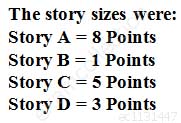PMI-ACP : PMI Agile Certified Practitioner : Part 11
-
Continuous attention to_____________ and good design enhances agility.
- Best architectures
- Technical excellence
- Robust plans
- Change control
-
The best description of a Sprint backlog is:
- Daily progress for a Sprint over the Sprint’s length
- A prioritized list of tasks to be completed during the project
- A prioritized list of requirements to be completed during the Sprint
- A prioritized list of requirements to be completed for a release
-
This Agile methodology focuses on efficiency and habitability as components of project safety.
- Scrum
- Kanban
- Extreme Programming
- Crystal Clear
-
A time-boxed period to research a concept and/or create a simple prototype is called a(an):
- Sprint
- Iteration
- Spike
- Retrospective
-
In Scrum, who is responsible for managing the team?
- Scrum Master
- Project Manager
- Development Team
- Product Owner
-
Simplicity – the art of_______________ is essential
- Maximizing the amount of work not done
- Minimizing the amount of work done
- Maximizing the customer collaboration
- Minimizing contract negotiation
-
This approach includes a visual process management system and an approach to incremental, evolutionary process changes for organizations.
- Kanban
- Scrum
- Extreme programming
- Agile Unified Process
-
Which following statement is the least accurate regarding the Burndown chart?
- It is calculated using hours or points
- It is updated by the development team daily
- It provides insight into the quality of the product
- It reflects work remaining
-
What can be described as “one or two written sentences; a series of conversations about the desired functionality.”
- User Story
- Story point
- Epic
- Product roadmap
-
This artifact contains release names with expected dates and includes major features, client-side impacts, server-side applications, platform support and markets served:
- Risk burndown graph
- Product roadmap
- Release migration plan
- Product vision
-
Which statement is least accurate when providing a definition of “Done”?
- It is the exit criteria to determine whether a product backlog item is complete
- It may vary depending on the project
- It is defined by the Scrum Master
- It becomes more complete over time
-
All of the following are among the seven principles of the Lean approach with the exception of:
- Amplified learning
- Decide as late as possible
- Build integrity in
- Maximize the work performed
-
Typically calculated in story points, this is the rate at which the team converts “Done” items in a single Sprint:
- Burndown rate
- Burn-up rate
- Velocity
- Capacity
-
All of the following occur in the second half of the Sprint planning meeting EXCEPT:
- The Development Team identifies improvements that it will implement in the next Sprint
- The Product Owner is answers questions and clarifies User Stories
- The Development Team commits to work in the Sprint
- Tasks are defined for the User Stories
-
The best architectures, requirements, and designs emerge from:
- Hand-picked teams
- Co-located teams
- Self-organizing teams
- Cross-functional teams
-
The Sprint retrospective:
- Is intended to promote continuous process improvements
- Is held at the end of each release
- Is conducted to provide the sponsor with key information on team progress
- Is optional
-
An iteration prior to a release that includes final documentation, integration testing, training and some small tweaks is called:
- Hardening Iteration
- Buffer Iteration
- Release Iteration
- Integration Iteration
-
Analyzing the current organizational processes, per project requirements, and making needed process changes is called:
- Value Stream Mapping
- Release Planning
- Use Case Development
- Process Tailoring
-
At the end of first iteration, the team finishes User Stories A, Band 50% of C. What is the team velocity?

PMI-ACP PMI Agile Certified Practitioner Part 11 Q019 005 - 11.5
- 9
- 14
- 16
-
Suppose 8 new members joined the development team, and the team size is now 15. The daily Scrum is getting noisy and exceeding the 15 minutes time-box. What is the most effective way to address this situation?
- Divide the team into two teams with minimum dependency and have two separate daily Scrums.
- Do nothing; allow the large team to exceed the time-box by a few minutes each meeting.
- Increase the time-box for the daily Scrum to 30 minutes.
- Ask the team members to only update on the impediments and highlight only the important ones.
Subscribe
0 Comments
Newest